Into Scottish Creatives: Kev Sherry
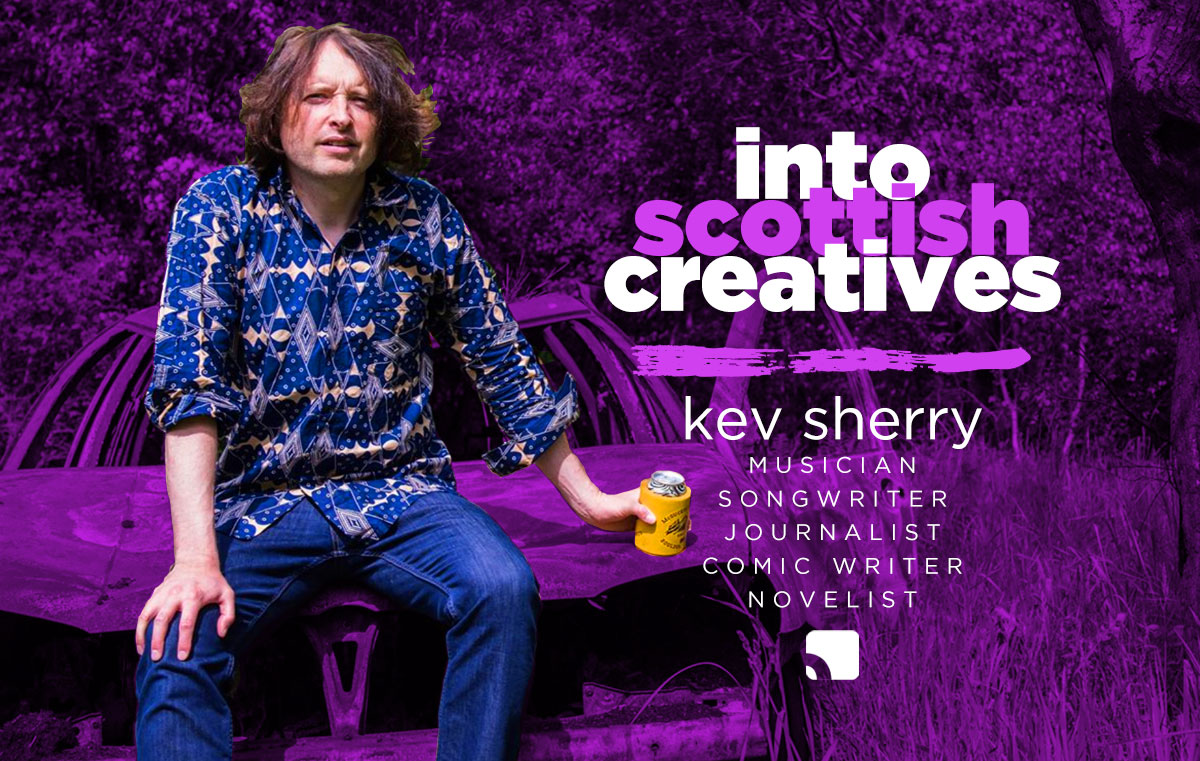
Kev Sherry is a Scottish songwriter, indie musician, journalist, comic writer and novelist. He has performed in the indie guitar band Attic Lights since 2005 who have released three critically acclaimed albums to date. Kev has recently recorded his debut solo album, Foxy Orthodoxy which is part of a triptych involving the comic Warpaint and his debut novel Here Be Apples. Kev was kind enough to take time out for this exclusive interview with John Welsh for our Into Scottish Creatives series.
You have a new single Feelgood Movie Of The Year out on 19 June 2020. Can you tell Into Scottish Creatives what the song is about? The video sees yourself and band playing to an audience whose dance moves are linked to a number of issues (i.e. Russian interference, Trump, climate change, electoral fraud, bigotry).
The song was written in Melbourne, Australia, sitting on a tram looking at everyone staring into their phones instead of the incredible views of the Melbourne skyline while everyone on the tram stared into their phones. It explores the way we present ourselves on social media, trying to remove our flaws and create almost Hollywood-like personas for ourselves – and how this ‘fakeness’ is a symptom of our wider society.
The video runs with this idea, heavily references the current zeitgeist: would-be dictators and demagogues, election interference from foreign powers, data manipulation, fake political saviours who serve themselves and their billionaire overlords rather than the public offices they represent, alternative facts, climate chaos, culture wars, demographic wars, trolling…. You know the story. It is happening all around us. This is the new normal. We all need to decide which tune we are dancing to as the sands shift: are we complicit – or are we the counter-culture to usher in change?
Do you think music still has a part to play in getting over socio-economic and political perspectives to help inform the listener?
The guitar music mainstream is an embarrassment and a disgrace, betraying the counter-culture heritage that rock’n’roll symbolises. Most major global stars are afraid to say anything contentious lest they scare off their fan base and upset record label shareholders. Music, like all art, is inherently political, whether that be the politics of a relationship or the politics that govern every element of human society. A few years ago Bobby Gillespie asked in an interview, ‘where are all the bands with something to say? Where are the bands that will take a political stance?’ He was right. Art and music should be a revolutionary experience.
The single of course will precede your debut solo album, Foxy Orthodoxy. Was the idea to record a solo record a deliberate one in terms of doing something different to the group set up you have with Attic Lights?
Attic Lights are a band who move at a fairly slow pace. As a group working together we seem to get around to a new album once every 4 years. I, on the other hand, am too impatient for that level of productivity. I make stuff all the time. I figured that if I started doing solo stuff it wouldn’t really get in the way of the Attic Lights release schedule too much. I also wanted to pursue more of my own ideas.
Attic Lights are a democracy so if all four of us aren’t on board with a song, the song tends to get dumped. This can work both ways. It means it keeps the Attic Lights sound very specific – a mixture of four opinions. It also means that some of the more eccentric or weirder ideas tend to get passed over.
I wanted to focus on those ideas a little bit more. Again, we don’t all share the same view of music as a political force so that is something I can explore more on my own.
Can you tell us a little bit of what inspired the album, what its songs are about and when we can expect to see it released?
The album is coming out on September 18th. It was inspired by a rediscovery of the indie music I listened to growing up. Artists like Courtney Barnett, Alvvays …. are taking the indie template and refreshing it for a modern audience.
The term ‘alternative’ is used these days as a marketing tool. You’d be hard pressed to distinguish between mainstream music and alternative now listening to mainstream radio or watching TV. But there is a thriving underground scene again and hopefully it can save a few people from banality.
Also, in terms of the song selection and recording process, as a solo artist did the more autonomous approach suit you more than say, a more collaborative band approach or did that give you some doubts without the benefit of others to kick ideas around?
When I release music with Attic Lights, I represent and speak on behalf of everyone in the band. I don’t really get into my own personal politics and opinions. There is no such barrier for my solo stuff. Plus, I can work faster and pursue odd ideas without debate. No disrespect to Attic Lights – it’s just a different way of working. You get different results.
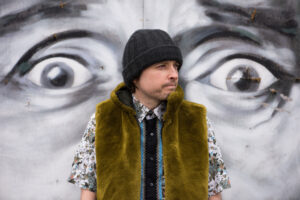
You had Producer Paul Savage on board who has worked with the likes of Mogwai and Franz Ferdinand. How did that come about and what did Paul bring to the record?
Paul and I had never met prior to working together but Glasgow being Glasgow, we had tons of mutual friends and acquaintances in the music industry. We met to chat about the album and our take on things really matched. He is so highly experienced that often I just sat back and let him do what he wanted with the songs. He’s a master at finding the centre of the song, what the sonic backdrop should be, how it should come across. That’s what I needed in lieu of a band – someone who could help visualise the sonic palette and add their own sprinkling of fairy dust.
You’ve also written a critically acclaimed graphic novel, Warpaint, which is linked to Foxy Orthodoxy. Can you outline how your vision from writing a graphic novel to linking to a music album took shape?
I was working on both projects at the same time and they just sort of bled over into one another in terms of themes and characters. It sort of happened and then as I realised it was happening I more consciously linked the two. I’ve always wanted to write comics and I figured I might as well do it now instead of just thinking about it all the time. I also wanted to write something with power and confrontation to it. I wanted to create the same experience for my reader as great comics have done for me over the years.
Warpaint was very well received by the critics. There was a potential juxtaposition in that it was written as a feminist story penned by a male writer. Were you concerned at the time about how it would be perceived and how did you consider writing it i.e. did you seek out views from your female friends?
I was aware that as a man, it could be seen as a bit odd writing about feminism. But I don’t think you have to be a woman to be a feminist and to explore feminist ideas. I did extensive research talking to my partner and to my female friends. I also made I sure that I wasn’t writing about female experiences per se, but rather patriarchal society’s reaction to female experiences. I felt I could bring some honesty and truth to that element of it.
I also roundly reject the notion that writers should only write about their own direct experience. To argue that is to invalidate the whole idea of the human imagination and empathy. With the caveat of course that there is a whole history of colonial art created by dominant cultures attempting to speak in the voice of the disenfranchised. That is an issue I knew I wanted to avoid. I like to think I’ve been successful in that, the reviews by feminist writers and websites have been highly complimentary and have understood that I wasn’t trying to write from a woman’s perspective.
Looking back on your recording career with Attic Lights and with 3 albums recorded, do you have plans to resurrect the band at some point in the future and make new music?
I’m sure we will do another album. Attic Lights is as much a bunch of close friends as it is a band, and I see the other guys regularly. We work sporadically these days given everyone has their own lives and families and things to do. I’m very proud of our three albums – especially the latest one from last year, which I think is our best (see the previous Into Creative review of Attic Lights – Love In The Time Of Shark Attacks here). And occasionally mad things happen like our songs end up on Netflix or HBO shows. So Attic Lights will always be there and we’ll get around to album number four at some point.
Attic Lights (as many artists do) have recorded a few interesting cover versions over the years (Bright Eyes, Since Yesterday, I Could Be So Good For You (Minder theme)). I’m always interested to see how an artist interprets another artists work but how do you decide what to record/cover – conscious effort to try something left field, reinterpret a song you like or something else?
Most of the times it just comes down to what we have been listening to and mucking around in the rehearsal rooms when we should be rehearsing our set. One day, Jamie started playing Bright Eyes, but in a 4/4 standard rock time signature and it just sounded great so we all started playing it. We did it live a few times and the crowds loved it – so we recorded it as a B-Side.
With the song from Minder, we used to play that as a cover in our set in the early days and word must have got around because when Channel 5 resurrected the show, we were asked to do it. We did debate whether we should do it…. ie: will it be considered an uncool thing to do? Then we remembered our mantra. Fuck other people’s opinions. We do what we think is fun.
On a similar vein, your music has been mixed by the likes of The Vaselines, Mogwai, Camera Obscura, Jim Noir and The Fratellis. Is there a sense of trepidation handing over what you’ve written, cultivated and produced to another artist without knowing what the mix will sound like when it comes back?
Not at all. I’m not precious about my material. I love seeing how other people can take it, fuck it up, chop it to pieces and rebuild it.
And is there any artist you’d love to work with whether it’s as a collaboration or as a mix?
Too many to mention really. It would be cool to do something with a band like Phoneix, or work with songwriting heroes of mine like Robert Forster, Peter Buck etc… And of course, if McCartney wanted to hook up and jam, I wouldn’t say no.
We can’t do an interview without mentioning Coronavirus which is impacting everyone of us with devastating effect on many families, friends and local businesses. As a writer and journalist, what are the key things you are observing during this time?
The sense of social cohesion, of pulling together and of protecting one another. It gives the lie to the right wing idea that we are all selfish. Human beings are inherently communal and peace-loving. I guess this has proven that. Of course there are outliers who break the rules, but the vast majority of people are doing their best to get through this and be respectful and kind to one another. That’s what I love.
The impact on the music scene is of course huge too. Many small venues which give a platform to aspiring/new artists are struggling to survive – what can be done to support them?
I genuinely don’t know. I guess government funding is the obvious one – but the Tories are no friend to the arts. I think that when this is over, we can all just get out there, get to gigs, start up new venues, support the arts community in any way we can. We can’t rely on the government. We need to do it ourselves.
What have you been doing during lockdown?
Pretty busy with promo for my forthcoming single releases and album release. Also been writing my next solo album and writing two new comics. No idea when any of these new ones will be released but I ‘m trying to get ahead of the game.
You have your debut novel coming out in 2021, Here Be Apples. Can you explain what the premise is?
It’s the story of a small time indie band on tour, collapsing under the weight of their own egos. It also explores anarchist ideas of authority, ideology and belief systems. Not sure when it is coming out or whether it will be self-released or with a publisher at this stage – but hopefully it will be out in 2021 regardless.
In terms of the writing process for the book, we’d love to know how you approach it as many authors have really different styles, what works for you?
Kind of similar to the process of songwriting for me. You have the idea, then you just splurge it all out onto the page. Take a break, go back to it and see what needs improving… then repeat process until a full novel has appeared.
Lastly, thinking back to all the gigs you’ve attended, which one stands out the most as really memorable and why?
Hard to answer. When I was 15 I saw U2’s Zoot TV tour at Parkhead stadium and the mixture of live rock’n’roll and TV screens/weird avant garde art imagery and multi-media sensory overload really blew my mind.
Most recent would be David Byrne at the Glasgow Concert Hall. That is probably the best gig I’ve seen in a long, long time. Totally unique – a band all walking about with their instruments attached, lots of percussion, grooves, incredible dance/movement routines, amazing songs and just a completely unique experience.
Kev Sherry releases the single Feelgood Movie Of The Year on 19 June 2020 (and can be purchased here) which precedes his solo album Foxy Orthodoxy, fue to be released on 18 September 2020.

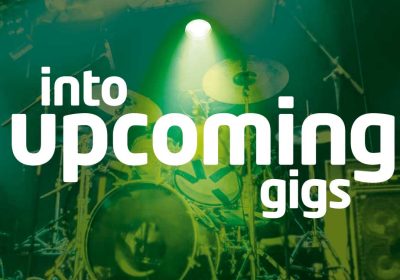
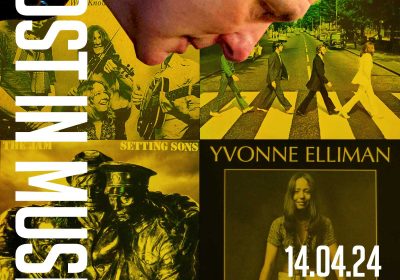
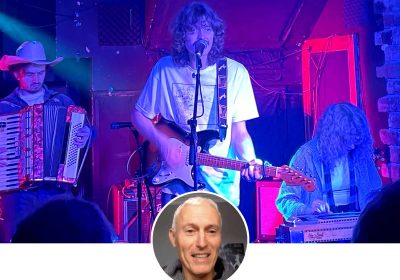
Leave a Reply
You must be logged in to post a comment.